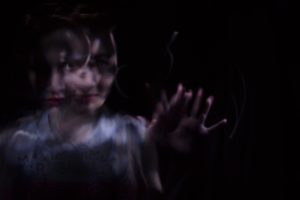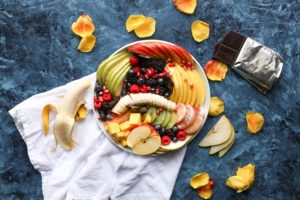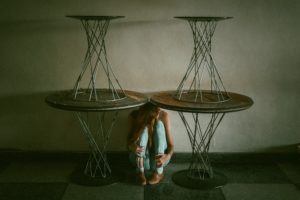Facts, Fear, and Footnotes
This tidbit landed in my Inbox this week. At first read, I simply agreed with it. As I’ve thought about it, though, I keep unpacking layers.
I’m sitting outside in the sun at our new house writing the old-fashioned way with a pen and paper on my knee, which is crusted with dirt. The knee, I mean, not the pen and paper! It’s too bright for my laptop out here. Inside, our plumber and his assistant are deconstructing our upstairs bathroom. Fortunately, we still have a dumpster. We are pleased to have our plumbing issues addressed: slow drains, old water damage, leaking pipes, and an unpleasant whiff of sewer now and then. We will be even more pleased to have a working shower.
And it all costs money. A lot of money.
With no work as a distraction on this day off, I spent the morning in the garden, where I was thoroughly happy and busy. That took care of the morning. I got dirty (knees) and bug bitten. We have no water at the moment, so I’m going to stay dirty until the plumbers leave for the day, although, come to think of it, I don’t know the water will be turned back on when they leave. Hmm.
Anyway.
Near noon I went inside for shade and a cold drink, but the sounds of banging, sawing, and the shop vac, along with a steady stream of construction debris and old bathroom fittings being carried down the stairs and out the door on the way to the dumpster fueled my anxiety, so I turned to the comfort of writing, as I so often do. I started by catching up on my email, where inspiration frequently lurks.
It was then I read Godin’s brief thoughts about fear and footnotes. He suggests when we feel nervous and afraid about the “information” we’re writing or speaking about, we don’t show our sources, references, and work.
It made me think about my own fear about scarcity today. If I showed my work about that, about the fear I’ll run out of money and have to spend the rest of my life under a bridge, what would it look like?
Have I ever lived under a bridge?
No.
Have I ever been in serious want?
No.
Have I ever been homeless or truly hungry?
No.
Do I have a job I love and for which I’m paid?
Yes.
In essence, I have no work to show because my fear of scarcity is nothing but an old ghost, an ancient traumatic wound, irrational and mostly in my head.
Interesting. Does lack of research and background information indicate a measure of fear in our discourse, a measure of uncertainty, a degree of irrationality, even?
Perhaps.
It’s a fact that I like my information (facts) served up with links, references, and footnotes. Content presented as information (facts) without such foundations is suspect in my eyes, and I do further research. Far too many people in cyberspace call their opinions, pathologies, disorders, fetishes, and lies facts.
On the other hand, some information (facts) is so widely accepted, taught, and promulgated footnotes are hardly necessary. An example of this is diet. Much of our (broken) healthcare system is built on the foundation of “facts” about what constitutes a healthy and appropriate diet.
But what if these “facts” arise from corrupted data? What if the real truth is less profitable for those in power and thus has been buried? For decades?
Collecting data and testing hypotheses requires funding. Doing it well requires a lot of funding. Corporations and other entities with deep pockets may have a vested interest in the outcome of studies. It’s not impossible to imagine unpalatable findings (by which I mean findings which threaten profit) are buried or deleted. It’s also not hard to imagine studies designed to explore data contradicting the (profitable) status quo can find neither funding nor support in the most powerful scientific schools and journals.
An unhealthy population is enormously profitable for some people, and those people have a lot of power.
This sort of thing has, after all, been going on since the time of Galileo, the sixteenth century astronomer who was interviewed by the Inquisition, forced to recant his scientific findings, and spent the end of his life under house arrest.
The thing is, he was a scientific genius, and he was right.
But the Catholic Church, very powerful during that period of history, felt threatened by his conclusions.
In other words, they were afraid. So they shut him up. Fear = silencing.
But that doesn’t change the fact that he was right.
Tens of thousands of articles are available online about the health benefits of a plant-based diet. The better written, more thorough ones contain resources and links to various studies and data. However, one can also find studies and data by well-qualified scientists and doctors (mostly in other countries) indicating the reverse: a plant-based diet may cause a myriad of health problems.
Critical thinking, the ability to assess a problem or question, research, look at data, ask questions, and analyze findings, is an equal opportunity playing field unless we have no access to information (like the Internet) or are unable to read and write. What this means to me is we all have a right to question information, research for ourselves, and look for a variety of sources and references. Critical thinking in the modern age means we must be able to separate a fact from an opinion, information (facts) from lies.
That’s a big problem. I’m quite confident a plant-based diet caused me years of health problems and pain and the biochemical results (demonstrable data) my current carnivore diet provides to my doctor are not dangerous or problematic. My healthcare provider disagrees. Vehemently. I want to talk about my research, resources, and links. I want to ask questions. I want resources my provider might have access to which I haven’t found or don’t know about. I believe I have some solid data to back up my questions and concerns. I also know I am frequently wrong, and I’m as susceptible as anyone else to the glamour of bullshit wrapped up in science.
My healthcare provider refuses to discuss it.
So there we are. I’m not afraid to be wrong, but I am afraid to be in pain. My healthcare provider is part of a broken system. How much power does she have, really, to deal with someone like me? How much time does she have? How much energy or even interest? It’s much easier to fill out a one-size-fits-all prescription for a plant-based diet or pharmaceuticals. Her job may be in jeopardy if she doesn’t feed me with the medical establishment’s current party line.
Meanwhile, in the eyes of some others, I’m murdering the planet, taking poor care of my health, and clearly believe in hate and violence toward animals. Any self-respecting member of PETA would set my house on fire.
None of that is true, from my perspective. None of it is even fact. I could provide several links and resources challenging those statements, many of them by scientists and including studies and data. But many, many, people would believe all those things and more about me based on my dietary choices, and they too could provide links, resources, and numerous studies and scientific conclusions supporting their point of view.
I agree with Godin. We should show our work. It won’t make everything magically clear because information from different sources frequently conflicts, and not all information sources are trustworthy, but showing our work helps us remember science is built on the shoulders of those who came before us (like Galileo), and honors the scientific process. Heck, it honors creative process. Godin’s original post is three lines. I just wrote more than 1,000 words because he poked at me and made me think, explore, question, wonder.
We are all connected, whether we like it or not. Showing our work makes us a little more human, a little more humane, a little more thoughtful, a little more careful. People who won’t show their work set off my radar. What are they hiding? Why don’t they have the courage of their convictions? Why are questions and investigations so threatening they must be silenced or stopped?
As for the inside of my own head, I need to show my work to myself, too. Anxiety thrives on the stories we tell ourselves without regard to whether the stories are true or have ever been true. We all need to be clear about the difference between our stories and opinions and information (facts). Stories and opinions have their place, but they’re not facts we can research, footnote, and independently verify. If we can’t show our work, perhaps we’re no longer in the realm of facts. If we won’t show our work, we lose credibility with people who think critically.
Updating a bathroom costs some money. We have some money. Those are the facts.








